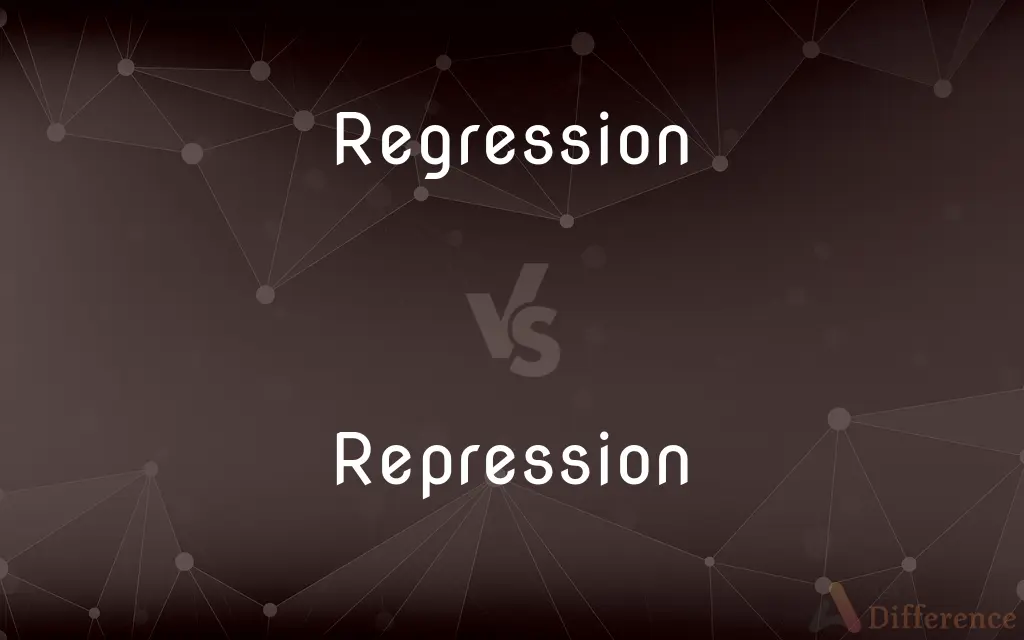Regression vs. Repression — What's the Difference?
By Tayyaba Rehman — Updated on December 27, 2023
'Regression' is a return to an earlier or less advanced state or form, often in psychology or statistics, while 'Repression' is the psychological act of excluding desires or impulses from one's consciousness.

Difference Between Regression and Repression
Table of Contents
ADVERTISEMENT
Key Differences
Regression, in psychological terms, refers to reverting to an earlier developmental state, often as a defense mechanism when faced with stress. In contrast, repression involves unconsciously burying unpleasant feelings, memories, or desires, keeping them out of conscious awareness.
In statistics, regression is a method for modeling the relationship between dependent and independent variables. Repression, having no statistical connotation, remains solely a psychological concept, dealing with the mind's way of handling emotional conflict or stress.
Regression can be observed in behaviors that are atypical for the individual's current level of development, such as an adult throwing temper tantrums. Repression, however, is not typically observable, as it involves pushing disturbing thoughts to the subconscious.
While regression can be a temporary response to stress, showing through behaviors or attitudes, repression is a more enduring aspect of one's psychological makeup, influencing behavior in less direct, more subconscious ways.
To summarize, regression is about a visible, often temporary, reversion to an earlier state, in behavior or analysis, while repression is a continuous, subconscious process of hiding away uncomfortable thoughts, feelings, or desires.
ADVERTISEMENT
Comparison Chart
Definition
Return to an earlier developmental state or a statistical method.
Psychological act of excluding impulses from consciousness.
Field
Psychology and statistics.
Psychology.
Manifestation
Observable in behavior or data patterns.
Subconscious and not directly observable.
Duration
Often temporary or situation-specific.
Usually long-term and continuous.
Purpose/Use
Defense mechanism or analytical tool.
Mechanism to handle emotional conflict or stress.
Compare with Definitions
Regression
Reverting to an earlier or less complex form.
The company noticed a regression in their production processes.
Repression
Unconscious exclusion of painful impulses or desires.
Repression of her early ambitions contributed to her dissatisfaction.
Regression
Temporary reversion to a previous stage of development.
She showed regression in her coping abilities after the incident.
Repression
Psychological process of pushing disturbing thoughts to the subconscious.
His anxiety was partly due to the repression of traumatic childhood memories.
Regression
In technology, a backward step in development or progress.
The software update caused a regression in system performance.
Repression
The act of repressing or the state of being repressed.
Regression
A statistical method to predict values of a dependent variable.
The study used regression analysis to understand consumer trends.
Repression
(Psychology) The unconscious exclusion of painful impulses, desires, or fears from the conscious mind.
Regression
The process or an instance of regressing, as to a less perfect or less developed state.
Repression
The act of repressing; state of being repressed.
History shows that when governments fear the truth and increase repression, their days are limited.
Regression
(Psychology) In psychoanalytic theory, reversion to an earlier or less mature stage of psychological development.
Repression
The involuntary rejection from consciousness of painful or disagreeable ideas, memories, feelings, or impulses.
Regression
(Medicine) Subsidence of the symptoms or process of a disease.
Repression
The act of repressing, or state of being repressed; as, the repression of evil and evil doers.
Regression
(Statistics) A technique for predicting the value of a dependent variable as a function of one or more independent variables in the presence of random error.
Repression
That which represses; check; restraint.
Regression
(Astronomy) Retrograde motion of a celestial body.
Repression
A state of forcible subjugation;
The long repression of Christian sects
Regression
(Geology) A relative fall in sea level resulting in deposition of terrestrial strata over marine strata.
Repression
(psychiatry) the classical defense mechanism that protects you from impulses or ideas that would cause anxiety by preventing them from becoming conscious
Regression
An action of regressing, a return to a previous state.
Repression
The act of repressing; control by holding down;
His goal was the repression of insolence
Regression
An action of travelling mentally back in time.
Repression
Keeping unwanted feelings or experiences out of conscious awareness.
Through repression, he remained unaware of his underlying anger.
Regression
(psychotherapy) A psychotherapeutic method whereby healing is facilitated by inducing the patient to act out behaviour typical of an earlier developmental stage.
Repression
A defense mechanism to avoid dealing with stressors.
She used repression to handle the emotional turmoil of loss.
Regression
(statistics) An analytic method to measure the association of one or more independent variables with a dependent variable.
Repression
Subconscious avoidance of thinking about unpleasant experiences.
Repression of unpleasant facts made him appear carefree.
Regression
(statistics) An equation using specified and associated data for two or more variables such that one variable can be estimated from the remaining variable(s). Category:en:Functions
Regression
(programming) The reappearance of a bug in a piece of software that had previously been fixed.
Regression
(medicine) The diminishing of a cellular mass like a tumor, or of an organ size.
Regression
(exercise) The making an exercise less straining to perform by manipulating the details of its performance like loaded weight, range of motion, angle, speed.
Regression
The act of passing back or returning; retrogression; retrogradation.
Regression
An abnormal state in which development has stopped prematurely
Regression
(psychiatry) a defense mechanism in which you flee from reality by assuming a more infantile state
Regression
The relation between selected values of x and observed values of y (from which the most probable value of y can be predicted for any value of x)
Regression
Returning to a former state
Regression
Psychological return to a previous developmental state.
Under stress, he experienced a regression to childlike behaviors.
Common Curiosities
Can regression be observed in children?
Yes, children can exhibit regression, often as a response to stress or changes in their environment.
What causes regression in adults?
Adult regression is often triggered by stress, trauma, or insecurity.
Is regression always a negative response?
Regression is not always negative; it can be a temporary coping mechanism.
How does repression affect mental health?
Repression can lead to unresolved conflicts and contribute to mental health issues like anxiety or depression.
How is regression used in therapy?
In therapy, understanding regression can help address unresolved issues and behaviors.
Does repression occur consciously?
Repression is an unconscious process and not done deliberately.
How does one become aware of repressed emotions?
Awareness of repressed emotions often requires therapeutic exploration and self-reflection.
What's an example of repression in everyday life?
An example is forgetting an unpleasant experience from childhood due to repression.
Can regression happen in response to positive events?
Regression typically occurs in response to stress or negative events, rather than positive ones.
Can repression lead to physical symptoms?
Yes, repressed emotions can manifest as physical symptoms like headaches or fatigue.
What is the role of regression in statistical analysis?
In statistics, regression is used to predict and understand relationships between variables.
Is repression a healthy coping mechanism?
Repression is generally not considered a healthy coping mechanism as it avoids dealing with the root of emotional issues.
Can regression analysis predict future trends?
Yes, regression analysis can be used to make predictions about future trends based on current data.
Can repressed memories resurface?
Yes, repressed memories can resurface, often triggered by specific events or stimuli.
How can regression be addressed in adults?
Addressing adult regression involves therapy to understand and cope with underlying stressors.
Share Your Discovery

Previous Comparison
Spacker vs. Spastic
Next Comparison
Wide vs. BigAuthor Spotlight
Written by
Tayyaba RehmanTayyaba Rehman is a distinguished writer, currently serving as a primary contributor to askdifference.com. As a researcher in semantics and etymology, Tayyaba's passion for the complexity of languages and their distinctions has found a perfect home on the platform. Tayyaba delves into the intricacies of language, distinguishing between commonly confused words and phrases, thereby providing clarity for readers worldwide.















































